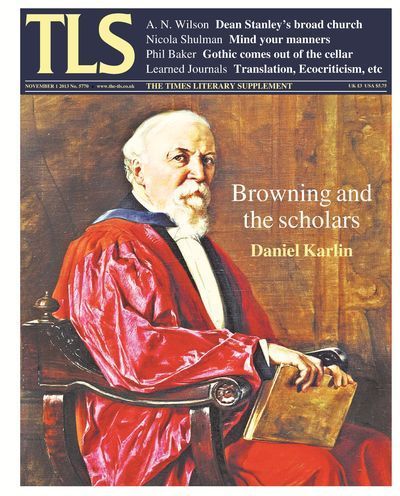In this week’s TLS – a note from the History editor
Robert Browning, as Daniel Karlin reminds us this week, was sensitive to
criticism, and even more sensitive to criticism of his wife. So when he read
a callous remark in Edward FitzGerald’s posthumously published
correspondence, he was moved to retaliatory verse. The sonnet he dashed off
to the Athenaeum is printed in the final volume of the Ohio/Baylor
edition of Browning’s works, though much of the back story is missing from
the editorial matter. The question of editors’ obligations to the authors
they take on is always a complex one, and never more so, Karlin argues, than
in Browning’s case. Browning’s own attitude to scholars who tried to study
his work prompts Karlin’s melancholy reflection that “the activity on which
I have spent a good part of my career is one which I have every reason to
believe the poet thinks impertinent, stupid and (to use his own words)
‘absolutely contemptible’”.
Arthur Conan Doyle, like Browning, was widowed, but his wife’s death was one
among several (or millions, if you include those in the First World War)
that touched the writer and fostered his interest in spiritualism. Reviewing
a new work on Conan Doyle, Jonathan Barnes is taken with the suggestion that
he arrived at spiritualism “along the path of science”, convincing himself
(as later with the existence of fairies) that life after death was “simply
there”.
Donna Tartt has an unusually slow rate of production for a contemporary
novelist. Alex Clark reviews her third novel in as many decades, The
Goldfinch, a characteristically ambitious exploration of a young man’s
reaction to the violent death of his mother, which Clark finds “impressively
mysterious . . . a pretend picaresque that refuses to stay on track”.
These gloomy topics might seem appropriate for the time of year when
Christians observe the “days of the dead”, and Western children dress up to
demand sweeties with menaces. Phil Baker sees in an Encyclopedia of the
Gothic the spread of such concerns beyond the confines of “genre”
literature or seasonal observance. Gothic, he writes, has “climbed out of
the cellar”. It is now “a way of life”.
David Horspool
Peter Stothard's Blog
- Peter Stothard's profile
- 30 followers




